
(Photo by Frederick M. Brown/Getty Images)
Not everyone gets their big break on a global hit television series right out of drama school, but that’s exactly what happened to John Bradley. In 2011, the Manchester, England native auditioned for HBO’s Game of Thrones and landed the role of Samwell Tarly, the bookish sidekick to Jon Snow whose role on the series has become an increasingly pivotal one.
Over the years, Bradley has had a few opportunities to pursue other projects, but GoT remains his best known work. With the series currently on hiatus until its eighth and final season airs at some undetermined point in the future, Bradley is spending some time promoting his new film, American Satan, a Faustian thriller about a struggling rock band that finds success after inking a deal with a mysterious stranger. RT spoke to Bradley about his Five Favorite Films and quickly learned he is as passionate about movies as Sam Tarly is about the history of the White Walkers.
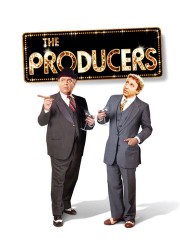
In terms of the first film that I remember having a real visceral connection with me, it’d be The Producers, the original Producers, with Mel Brooks. There was something about such a rich movie, in terms of the richness of the ideas and the power of the quality. If you take the two central performances of Gene Wilder and Zero Mostel, they’re such powerful performances. And you think that they’d both be almost too much for the screen because they both put in so much detail and they both bring so much energy. And they’re both such ballsy and powerful performances, you’d think that the screen wouldn’t be able to contain it. Especially because I was watching it on a TV screen, you think no screen is big enough to contain these two’s performance.
But there’s something about the way they work together and the way their styles complement each other and the suitedness of those characterizations, the detail that they both put in. There was something about that. When you get two performers that are so beautifully in sync with each other, it’s like a jigsaw. Whatever one of them’s missing, the other kind of fills in with a perfectly compatible performance. It’s like listening to an opera, listening to those two perform with each other. I feel that way a lot about Mel Brooks in general, in terms of the way he writes and directs. There’s such musicality to that comedy. It’s so specific, and it reads like a musical score. You have to be able to play that absolutely precisely. There’s almost not enough room for interpretation on it.
And for actors, they have to be able to say the lines. But the thing about Zero and Gene Wilder is they nail the musicality of it so perfectly and yet manage to layer all of this beautiful character on top of it as well. And they really attacked it. The chemistry and the musicality between them was something that really made me sit up and take notice when I was a young kid. It was very powerful, I remember it very vividly, seeing that for the first time.
RT: How old were you when you saw that?
I was probably ten. I remember I was allowed to stay up and watch it on a Saturday night. My dad loved it — my dad introduced me to it and he let me watch it. There was something about the size of those performances. They’re almost theatrical performances on the screen. You don’t really get that anymore. A lot of comedy — for better, usually, but sometimes for worse — has gotten much more kind of screen-orientated, and actors play to the camera a lot. But this is almost the size of a Broadway musical, these performances, and that’s what I loved about it. They leap out of the screen with that energy and that characterization, and I just couldn’t get over the power of it. It was extraordinary.
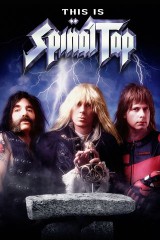
Number two is slightly different. There are similarities. It’s gotta be This Is Spinal Tap. It’s gotta be that. Just the detail of that as well. What I love about Spinal Tap is, I think it’s the first example of that; it has been carried on through things like The Office and Arrested Development, because they have quite similar qualities. It’s comedy that’s made for people with a sense of humor. You actually have to have quite an attuned sense of humor to know why things are funny in that. I think some comedy is written and performed at an audience, like,”This is it, this is funny. You are not funny, but you’re gonna watch us be funny.”
The thing about a lot of that stuff — and I think Spinal Tap is the kind of crystallization of that — you have to be quite a funny person, and have quite a grasp of the work in the comedy to know why Derek Smalls saying, “David, ‘Smell the Glove’ is here. Hello, Jeanine,” over the microphone is a funny thing for him to do. And you have to know why that’s an inappropriate thing to do. And you have to have an understanding of the rules of comedy, and just the rules of everyday social graces to know why that is funny. I kind of like being part of that exclusive club. You’re kind of in on the joke. It’s a communal experience because we’re trusting you that you’re smart enough to know why this is funny without us having to describe it and spoon feed it to you. I like the elitism of being part of that club.
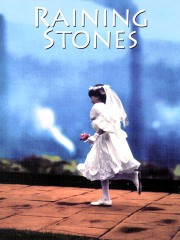
Number three would be a Ken Loach film. I love Ken Loach very much because I love what he stands for politically. I love his bravery and I love the way that he really wanted to get these very socio-economic stories and real examinations of society in England and the unfairness of it. I think the way that he can manage to do that and make films that are entertaining as well, means that he’s such a master.
He did a film in 1993 called Raining Stones. It’s one of my favorite Ken Loach films, and it’s one of my favorite films in general. It’s a heartbreaking story about an unemployed man who has to scrape together the money for his daughter’s first Communion dress, because in the society that they live in, that’s quite an important thing. You have to have a new dress for Communion. It’s about the dignity of trying to find the money and not letting her go to this event with a secondhand dress. It’s about how people who would seem to be on the fringes of society and treated with a lot of contempt by a lot of conventional media — it’s an examination of how they do have moral compasses. They are human beings, and they do abide by a set of rules, and they’re not scum. They just had a very unfortunate break.
I think there’s something about that examination of that which is very deep psychological and socio-economic issues, but then in a very entertaining way. I think when you get a message combined with the entertainment value, I think that’s when you’re really on to something. Because if you have a story like that, which can be very depressing and very heartbreaking and very dour in other hands, if you can make that funny and actually make that interesting, you can put your message across all the more strongly. So I think that’s what I love about Ken Loach, the fact that he knows that in order to get people to listen to your message, you have to be able to entertain them. I think that’s a much harder thing to do than to just put a message across in a very prescribed way. He works hard to make things as entertaining as he possibly can, knowing that his message is gonna come across all the more effectively. I think he’s the king of the message.
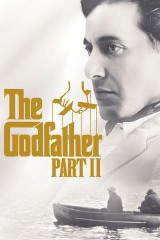
I have to say Godfather Part II, because the thing I love about Godfather Part II is Godfather Part I was one incredible story filled with incredible performances, deep psychological examinations of what it’s like to be in that position of authority, and the struggle with that and the conflict of all the stuff we see with most good gangster films, really. You get that in one story in The Godfather Part I. I think in The Godfather Part II, there’s two stories like that.
That’s what I love the most about it. It’s two wonderful gangster movies in one, and the richness of that, the way that they flip between those two stories, is something very, very special. It’s like two amazing movies in one movie. It would’ve been Godfather I, but the fact that Godfather II is two great movies in one movie just means it’s an embarrassment of riches. It’s just one of the greatest films of all time.
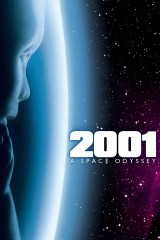
2001: A Space Odyssey. What I love about that is, in a similar way to Spinal Tap, it trusts the audience to have the patience that there’s gonna be something fulfilling in there. Not only the visuals. I think if you watch it now, with 21st century eyes, it can seem to some people like a very slow movie, where nothing happens for a long time. Visually it’s very innovative, but we’re so used to 15 cuts a second now that we’re not used to things being played out with that much pace and that much finesse and style and patience. I think, to watch it now, it’s seeing filmmaking with such confidence, the fact that he can hold those shots for as long as he holds them, and he can trust the audience to come along with him on the ride. It can be slow. It’s always visually breathtaking. But I think, to see it now, it looks like filmmaking from such a different time.
If it was made now, it would be an assault on the senses. Everything would be very quick, everything would be breathless, everything would be very frantic, but Kubrick was such a confident filmmaker that he was able to play that whole story out with such pace and such style and trust that the audience was smart enough to be dragged along for the ride and stick with it until the end. That’s what I love about it, the pace of it. The respect for the audience’s intelligence. I like to feel part of those clubs and I think 2001 is the ultimate example of that kind of club where, if you understand why this is brilliant, then you’ll do for me. If you understand why this is brilliant, then you’re my kind of guy. And I like being involved in those miniature elite subcultures. 2001 is the perfect example of that.
American Satan opens in limited release this Friday, October 13.